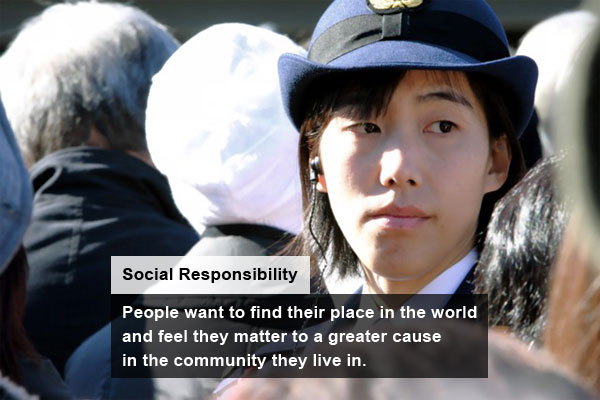Cultivating a Culture of Consciousness
“You are not here merely to make a living. You are here in order to enable the world to live more amply, with greater vision, with a finer spirit of hope and achievement. You are here to enrich the world, and you impoverish yourself if you forget the errand.”
Thomas Woodrow Wilson (1856 – 1924), was the 28th President of the United States from 1913 to 1921 and leader of the Progressive Movement. He served as President of Princeton University from 1902 to 1910 and was Governor of New Jersey from 1911 to 1913

Image by Edwin Lee
Why care? What’s in it for me? They may seem harsh, but these are questions that come to mind when I started thinking about organizational culture and social responsibility. What makes an organization care about more than the bottom line, or in the case of not-for-profits, their own mission? Can a culture have a collective conscious?
What is culture?
Let’s first consider what constitutes organizational culture. Well-known social psychologist and Professor Emeritus of Organizational Behavior at the MIT Sloan Graduate School of Management, Edgar Schein, has defined it as “the basic tacit assumptions about how the world is and out to be that a group of people share and that determines their perceptions, thoughts, feelings, and, their overt behavior.” (Schein, 1996) Others may describe it simply as “the way we do things around here”.
What forms that culture? In some cases, it is shaped by a leader or founder; in others, it may be more grassroots from employees, members, customers, clients; or it could be geographical – is the organization located near a site where there is extreme poverty, urban blight, a hospital, a school, a decrepit park, a polluted river, or on the positive side, is it near a sports arena, a parade route, a beach, majestic mountains?
What drives social consciousness?
Is it top-down or bottom-up? Does a leader inspire people to care about more than themselves or can average employees, or even youthful interns, inspire it? If the inspiration and heart comes from above, is it stronger, more lasting, more impactful?
I’ve come to the conclusion that it can be either. But what is the impetus? Why did people rally together after the attacks of September 11, 2001? Why did the ALS “ice bucket” challenge take the Internet by storm? Why is Eli Lilly & Company able to do a worldwide “Day of Service” in most of the locations it operates worldwide?
I came up with two things that stood out in all of these cases:
- Sense of purpose – Wanting to leave an impression on the world that what I did mattered, somehow
- Sense of belonging, or connectedness – Wanting to feel part of something larger with a group of people who shared the same experience
Can a culture change and “grow a conscious”?
There is the model that culture is like an iceberg where all the unseen shared values, beliefs and experiences manifest themselves into a more visible set of behaviors, actions and communications. So, what would make that change? This can be an uphill battle; values, beliefs and experiences can be extremely engrained into people depending upon how they were raised, where they grew up, when they grew up, etc.
I am a proponent that any culture can change for the better, if there are some key elements in place. Essentially, it involves appealing to people’s hearts, making something personal to them, tying what they do to a larger purpose in the world. I may be speaking too much from personal experience, but I believe people want to find their place in the world and feel like they matter. Whether they are the mother working three jobs to feed her family, the young hipster founding an NGO (non-governmental organization) with the express purpose of changing the world, the hedge fund manager raking in the millions, the CEO of a global corporation, or me, the mid-career manager, I believe all people want to matter.
If you tie the organization’s purpose to a greater meaning in the world AND to your people’s individual lives, you may appeal to their sense of altruism, and love for their fellow man. Providing a supportive and encouraging environment for these qualities and activities to thrive goes a long way as well.
Fitting, as I finished this thought, Louis Armstrong’s “What a Wonderful World” came over the stereo system of the coffee shop where I was sitting, and I couldn’t help but thinking to myself, how true that is.
- Cultivating a Culture of Consciousness - November 18, 2014
- Opportunity Costs: Leading Amidst a State of Flux - October 14, 2014






Excellent and well thought post Beth!